Siamese is originated from Thailand but Torby is originated from United States. Both Siamese and Torby are having almost same weight. Both Siamese and Torby has almost same life span. Both Siamese and Torby has same litter size. Siamese requires Low Maintenance. But Torby requires Moderate Maintenance
Basic Information
undefined
Thailand
United States
Life Span:
12 - 20 Years
10 - 18 Years
Colors Available:
Chocolate point, seal point, blue point and lilac point.
Patches of red, cream, grey
Coat:
Short, thick and silky
Short- or long haired
Shedding:
Moderate
Moderate
Temperament:
Affectionate, Alert, Cheerful, Curious, Docile, Energetic, Friendly, Gentle, Independent, Intelligent, Lively, Loving, Loyal, Outgoing, Playful, Responsive, Social, Sweet, Territorial
Affectionate, Alert, Cheerful, Curious, Energetic, Friendly, Gentle, Independent, Intelligent, Lively, Loving, Loyal, Outgoing, Playful, Quiet, Responsive, Social, Stubborn, Sweet, Territorial
Grooming:
Low Maintenance
Moderate Maintenance
New Owners Friendly:
Yes
Yes
History
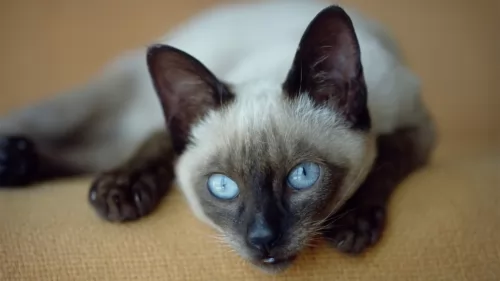 The Siamese cat is one of the most recognized cat breeds there are. The cat hails from Thailand and is the foundation stock for a number of other breeds.
The Siamese cat is one of the most recognized cat breeds there are. The cat hails from Thailand and is the foundation stock for a number of other breeds.
It comes in two distinct variations - traditional and the more modern Siamese.
In the United States, most of the top cat registries only consider the 4 original fur colors as Siamese – chocolate point, seal point, blue point, and lilac point.
The Torby is a rare cat and the name ‘Torbie’ is shortened for Tortoiseshell-tabby. They are known for their tri-colored coats. In fact, when a cat has tabby stripes along with Tortoiseshell markings, the results are Torbie.
Tortoiseshell cats are almost exclusively female. Males do exist but they are rare. They’re also referred to as Torties with their coat resembling that of the shell of a tortoise.
The colors represented are usually red, orange and black.
Just like the Tabby cat, the Tortie cat is not actually a breed, but is rather referring to the coat pattern. Pure breed cats such as the Maine Coon can also have a Tortoiseshell pattern.
Description
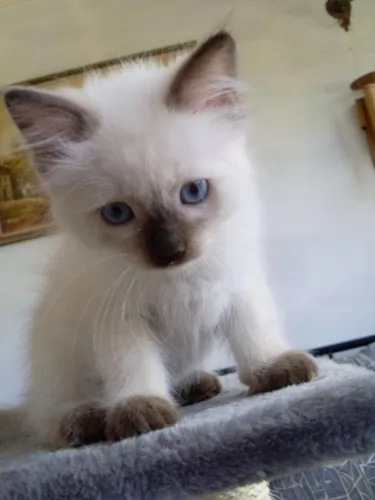 The Siamese cat is a medium-sized cat. Today’s Siamese cat is recognized by the triangular-shaped head, the slender, muscular body, the blue almond-shaped eyes, the largish ears, and the cream point colored coat.
The Siamese cat is a medium-sized cat. Today’s Siamese cat is recognized by the triangular-shaped head, the slender, muscular body, the blue almond-shaped eyes, the largish ears, and the cream point colored coat.
The face of the Siamese also has a mask of the same point color. Weighing at between 3 – 5kg, the Siamese has a long neck and slender tail.
All Siamese kittens are cream or white at birth, but they develop visible points in the first few months of life. The coat is short and glossy. By the time the kitten is 4 weeks old, the points are clearly distinguishable.
Temperament:
Siamese are affectionate, curious, playful, intelligent cats and are known for their vocal, social natures.
With the Siamese cat, you may see him bonding strongly with one particular person in the family.
They’re active cats and are also one of these cat breeds that are described as being more dog-like. Some of them become so attached to their human owners that they can become depressed or suffer from separation anxiety when left alone for long periods of time.
Because of the cat’s intelligence, he can be easily trained to respond to simple commands.
There is a type of tortie cat that is called a torbie and it comes with tabby-like features. They are striking looking cats and can be medium to large size, weigh between 3 and 7kg and be muscular and athletic.
Essentially when there are tabby stripes you get a Torbie. Some people call them patched tabbies because they are a tabby with
Temperament:
No two Tortoiseshell cats have the same personalities, and because they can be any breed of cat, they have a wide range of personality characteristics.
They can be energetic, docile, curious, lazy, playful, shy, reserved, aloof, social, friendly, angry, calm, or something else. Not every Torbie cat will have the same characteristics, but most make the most awesome pets.
It is true that a cat’s personality and behavior are formed a lot by the people who own it and the lifestyle they provide for it.
Characteristics
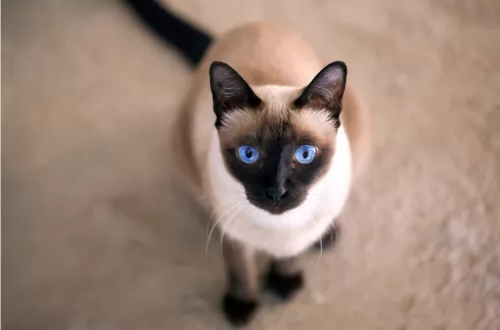 The Siamese cat is such a popular breed and with good reason. It makes a splendid companion for single people, families, couples, and older people. It gets on well with children and other pets too.
The Siamese cat is such a popular breed and with good reason. It makes a splendid companion for single people, families, couples, and older people. It gets on well with children and other pets too.
However, it is an energetic cat and won’t relish lying around day after day. He will want you to play with him and exercise him too, providing him with a stimulating environment.
These are such affectionate cats too, that it will be too sad if he lands up in a home where people don’t provide him with love and care. In exchange for that, you couldn’t ask for a better companion and friend.
Your torbie cat isn't going to turn out the same way as your friend's torbie cat. This is because torbie is just indicating the type of coat your cat has. Yes, they can be strong-willed, social and even angry sometimes, but they can also be quiet, sweet and content. Nothing is set in stone when it comes to a cat's personality.
The type of personality you have and the lifestyle you provide your cat with can play a big part in how your Torby turns out. Give him lots of love and care and you'll be blessed with an awesome friend and pet.
Health Problems
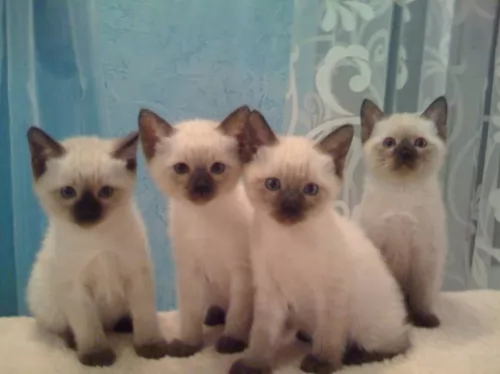 With good care, your Siamese cat can live to be between 12 and 20 years of age. It is a slim cat, so you want to keep him that way as becoming overweight can put a whole lot of pressure on the cat’s joints and bring on other health issues.
With good care, your Siamese cat can live to be between 12 and 20 years of age. It is a slim cat, so you want to keep him that way as becoming overweight can put a whole lot of pressure on the cat’s joints and bring on other health issues.
There are always some common cat diseases to watch out for and one of these is mammary tumors. They also battle with gastrointestinal problems and lung infections.
They are actually prone to respiratory problems, but this is more seen in younger cats. Upper respiratory infection with the Siamese cat will usually last about a week or it can go on longer.
Your cat with have a nasal or eye discharge, will be drooling as well as have ulcers around the nose and mouth with aches and pains aa well as lethargy.
Make sure that your Siamese cat is up to date with his vaccinations.
Torbie cats are such lovable felines and because they are describing the type of coat the coat has and not the breed, nobody can be sure how long these cats will live for.
Some will only live to be 10 while others can reach 15 to 18 years of age. The diet and lifestyle you give your torbie can influence his health and longevity.
Health issues in a torbie are certainly not connected to the color of the coat. No matter what cat breed you have, most of the common cat illnesses to watch for are issues that affect the kidneys, the eyes, the skin, and heart.
Make sure you get your torbie vaccinated against some of the deadly cat diseases there are.
Caring The Pet
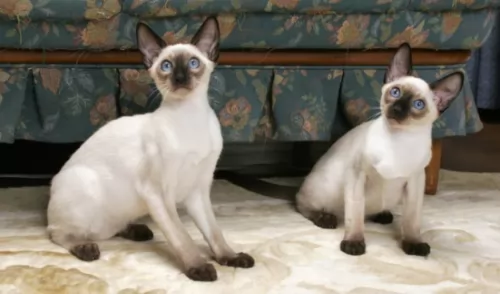 Good diet is one of the most important ways to care for your Siamese cat. Your cat is a carnivore and you therefore need to ensure he gets an appropriate diet otherwise you’re going to be spending more time at the vet with a sick cat than you’d like to.
Good diet is one of the most important ways to care for your Siamese cat. Your cat is a carnivore and you therefore need to ensure he gets an appropriate diet otherwise you’re going to be spending more time at the vet with a sick cat than you’d like to.
Always check with your vet if you have any uncertainties about feeding your Siamese kitten. Kittens will eat different food to an adult, and even in adulthood, there is commercial cat food manufactured for adult cats, pregnant felines, lactating cats, energetic cats, senior cats and sick cats.
Where possible, you will need to try and provide your cat with some fresh, raw meat too.
Never leave your cat without a bowl of fresh, cool water night and day.
The coat of the Siamese cat is thick, soft, and silky and he will require a brush every week to keep it like that.
They are agile, athletic cats, loving to jump up onto perches so it will be a good idea to provide a climbing tree or some other equipment where the cat can leap up onto.
Provide your cat with a litter box and make sure that the cat’s feces are removed every single day.
It can be difficult to decide which food to go with for your feline friend as the cat food manufacturers have provided pet lovers with a generous selection.
With a cat, it may be tempting to choose the cheapest option, but in the long run, it will just increase your vet bills. Diet plays a massive role in the health of your cat. The important thing to remember is that your cat is a carnivore and he will require meat as the biggest part of his diet. If in doubt, speak to your vet about the type of food to give your cat and how much.
Ensure your cat has a constant supply of fresh, cool water.
All cats are low-maintenance, and your Torby isn’t going to require much grooming. Make a habit of regular grooming, even if it is only once a week. Your Torby will also need his claws trimmed regularly. You can visit your vet or pet groomer to do this for you.
Just like human parents prepare for the arrival of a new baby, you have to prepare for the arrival of a cat in the home, whether it comes to you as a kitten or an adult.
Make a list of the essential cat accessories you will need.
Buy some fun toys for your Torby, more so if you are bringing a kitten home. Cats need to be stimulated to steer away from boredom.
Essentially your Torby checklist will look like this -
• Litter box and cat litter
• Cat bedding
• Veterinarian-recommended cat food
• Bowls for food and water
• Toys
• Collar with tag and contact info etched in
• Brush for grooming
• Scratching post
• Climbing tree
Comparison with other breeds
- Torby vs Abyssinian - Breed Comparison
- Torby vs Aegean - Breed Comparison
- Torby vs African Serval - Breed Comparison
- Torby vs Chausie - Breed Comparison
- Torby vs American Bobtail - Breed Comparison
- Torby vs American Curl - Breed Comparison
- Torby vs American Keuda - Breed Comparison
- Torby vs American Longhair - Breed Comparison
- Torby vs American Polydactyl - Breed Comparison
- Torby vs American Shorthair - Breed Comparison
- Torby vs American Wirehair - Breed Comparison
- Torby vs Applehead Siamese - Breed Comparison
- Torby vs Ashera - Breed Comparison
- Torby vs Asian - Breed Comparison
- Torby vs Asian Semi-Longhair - Breed Comparison
- Torby vs Australian Mist - Breed Comparison
- Torby vs Balinese - Breed Comparison
- Torby vs Bengal - Breed Comparison
- Torby vs Bicolor - Breed Comparison
- Torby vs Birman - Breed Comparison
- Torby vs Blue Russian - Breed Comparison
- Torby vs Bombay - Breed Comparison
- Torby vs Brazilian Shorthair - Breed Comparison
- Torby vs Bristol - Breed Comparison
- Torby vs British Longhair - Breed Comparison
- Siamese vs Abyssinian - Breed Comparison
- Siamese vs Aegean - Breed Comparison
- Siamese vs African Serval - Breed Comparison
- Siamese vs Chausie - Breed Comparison
- Siamese vs American Bobtail - Breed Comparison
- Siamese vs American Curl - Breed Comparison
- Siamese vs American Keuda - Breed Comparison
- Siamese vs American Longhair - Breed Comparison
- Siamese vs American Polydactyl - Breed Comparison
- Siamese vs American Shorthair - Breed Comparison
- Siamese vs American Wirehair - Breed Comparison
- Siamese vs Applehead Siamese - Breed Comparison
- Siamese vs Ashera - Breed Comparison
- Siamese vs Asian - Breed Comparison
- Siamese vs Asian Semi-Longhair - Breed Comparison
- Siamese vs Australian Mist - Breed Comparison
- Siamese vs Balinese - Breed Comparison
- Siamese vs Bengal - Breed Comparison
- Siamese vs Bicolor - Breed Comparison
- Siamese vs Birman - Breed Comparison
- Siamese vs Blue Russian - Breed Comparison
- Siamese vs Bombay - Breed Comparison
- Siamese vs Brazilian Shorthair - Breed Comparison
- Siamese vs Bristol - Breed Comparison
- Siamese vs British Longhair - Breed Comparison
 Petzlover
Petzlover The Siamese cat is one of the most recognized cat breeds there are. The cat hails from Thailand and is the foundation stock for a number of other breeds.
The Siamese cat is one of the most recognized cat breeds there are. The cat hails from Thailand and is the foundation stock for a number of other breeds. The Siamese cat is a medium-sized cat. Today’s Siamese cat is recognized by the triangular-shaped head, the slender, muscular body, the blue almond-shaped eyes, the largish ears, and the cream point colored coat.
The Siamese cat is a medium-sized cat. Today’s Siamese cat is recognized by the triangular-shaped head, the slender, muscular body, the blue almond-shaped eyes, the largish ears, and the cream point colored coat. The Siamese cat is such a popular breed and with good reason. It makes a splendid companion for single people, families, couples, and older people. It gets on well with children and other pets too.
The Siamese cat is such a popular breed and with good reason. It makes a splendid companion for single people, families, couples, and older people. It gets on well with children and other pets too. With good care, your Siamese cat can live to be between 12 and 20 years of age. It is a slim cat, so you want to keep him that way as becoming overweight can put a whole lot of pressure on the cat’s joints and bring on other health issues.
With good care, your Siamese cat can live to be between 12 and 20 years of age. It is a slim cat, so you want to keep him that way as becoming overweight can put a whole lot of pressure on the cat’s joints and bring on other health issues. Good diet is one of the most important ways to care for your Siamese cat. Your cat is a carnivore and you therefore need to ensure he gets an appropriate diet otherwise you’re going to be spending more time at the vet with a sick cat than you’d like to.
Good diet is one of the most important ways to care for your Siamese cat. Your cat is a carnivore and you therefore need to ensure he gets an appropriate diet otherwise you’re going to be spending more time at the vet with a sick cat than you’d like to.